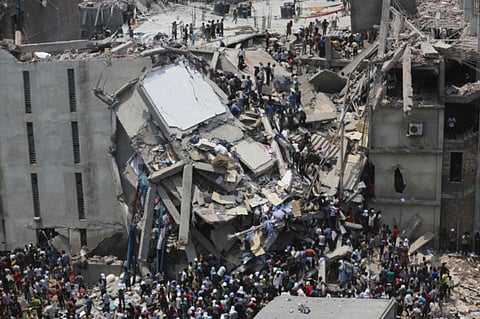Business-driven ethical practices
Even the most successful ‘ethical consumer’ drive is a minority shopping pursuit

It has been a month since the collapse of Bangladesh’s Rana Plaza — which housed several clothing factories. More than 1,200 people died.
Initial news headlines in the West were full of resolve: ‘Following deadly garment factory collapse, shoppers demand ethical standards’; ‘Much as we all like a bargain, we can no longer avoid facing up to the truth about sweatshops’; ‘Know what clothes you’re buying and what they really cost’.
I have seen enough predictions of ethical consumer uprisings to guess where this one was heading. ‘Bangladesh tragedy won’t affect most shoppers’ fashion decisions’, concluded Retail Week, citing an opinion poll that showed 44 per cent of Britons were no more likely after the disaster to ask where their clothes were made. The 13 per cent who said they were a lot more likely to ask is almost certainly an overestimate.
Academic research has long puzzled over the “intentions-behaviour gap”, the stark contrast between how much shoppers say they care about what they buy and what they end up buying.
Even the most successful “ethical consumer” movement, Fairtrade, which guarantees farmers a minimum price, is a minority shopping pursuit. Consumers worldwide spent 4.9 billion euros (Dh23.36 billion) on Fairtrade products in 2011. This was a creditable increase of 12 per cent. However, in the same year, Carrefour, the French supermarket company, had sales of 86.6 billion euros.
There is, however, an interesting story behind the rise in Fairtrade. Much of the increase is driven not by concerned consumers, but by manufacturers and retailers, who have opted to source entire product ranges from Fairtrade farmers.
Mars, the US food and confectionery company, uses only Fairtrade cocoa in its Maltesers chocolates in the UK and Ireland. Cadbury, the UK company later acquired by Kraft of the US, did the same for its Dairy Milk chocolate. J Sainsbury, the UK supermarket group, sells only Fairtrade bananas.
Companies adopt Fairtrade partly because they want to appear responsible, but they also have harder-headed reasons.
Mars’ explanation for its adoption of Fairtrade is typical. It is worried about farmers’ ability to produce the cocoa it needs. Many have ageing trees and poor yields. Unless farmers’ productivity improves, Mars says demand for cocoa could outstrip supply by one million tonnes by 2020.
This is where Fairtrade helps. It does not just provide a minimum price. Its farmers have to belong to producer organisations. The premium they receive has to go into local health, sanitation and education projects. Companies that opt for Fairtrade believe its farmers are more efficient.
Fairtrade puts its label on products from yoghurt to gold. Could it do the same for clothes? Could we see manufacturers and retailers adopting Fairtrade for their clothing for the same reason Mars did with chocolate — because workers would be safer, better-fed and more productive, while at the same time making those consumers who say they care feel better about what they wear?
The answer is probably no. A UK spokesperson for the organisation told me it was still struggling to promote cotton as a Fairtrade product. Monitoring a clothing supply chain all the way to the final product would be “incredibly complex”. And would consumers be prepared to pay extra?
This is a crucial question. If producers are to have a guaranteed minimum price, either the shopper has to pay more or the companies involved have to accept lower margins.
Some companies could afford it. Karl-Johan Persson, chief executive of Hennes & Mauritz, told the Financial Times last week that his company did not use a Rana Plaza supplier, but in other facilities “we see medium to luxury brands in the same factory, but they charge 10, 20, 100 times more”.
If pressure for change is not going to come from consumers or from Fairtrade, where will it come from?
European companies are signing up to a safety agreement in Bangladesh, but most US companies are resisting, saying they don’t like the proposed dispute resolution mechanisms.
Campaigners need to keep focusing on clothing factory conditions. So do we, the short-attention-span media. Forgetting those who perished while making our clothes would be unconscionable. Another tragedy of this sort should be unthinkable.
— Financial Times



